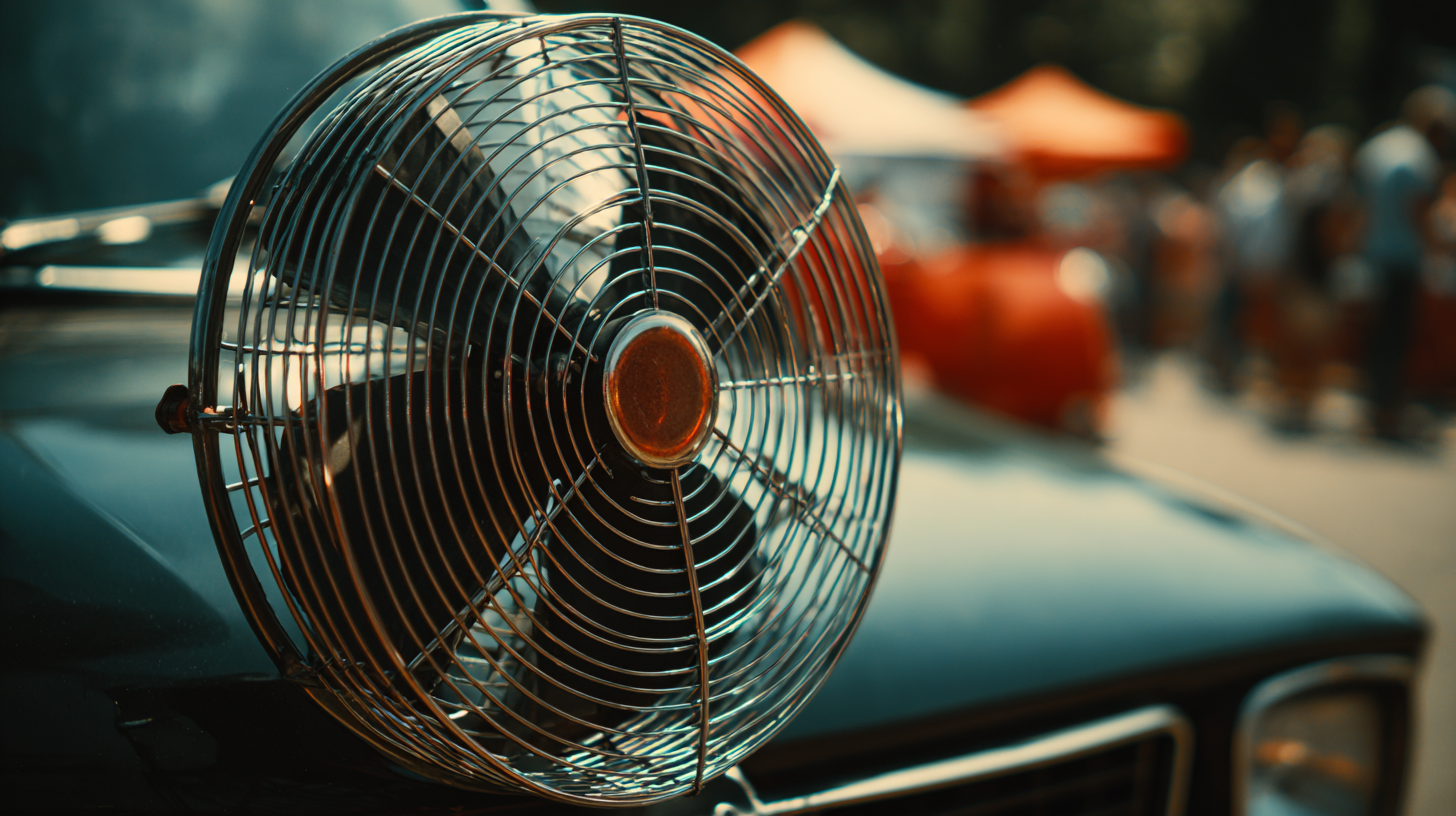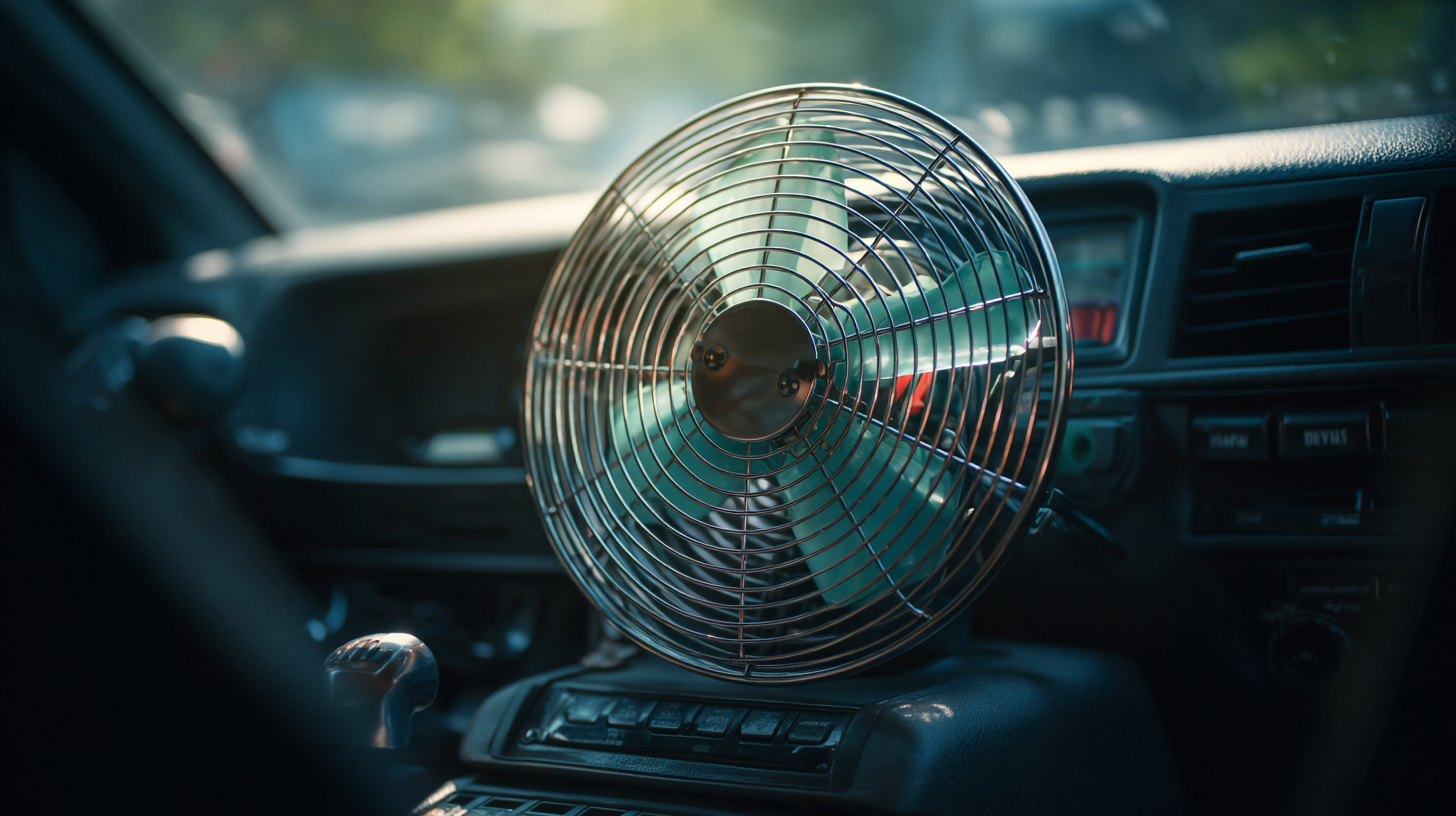In the ever-evolving automotive landscape, electric fans for cars play a crucial role in maintaining optimal engine performance and enhancing fuel efficiency. According to a recent report by the Department of Energy, effective cooling systems can improve engine efficiency by up to 10%, significantly impacting overall vehicle performance. However, drivers often encounter common issues with these fans, including inadequate airflow, electrical malfunctions, and noise disturbances. Understanding these challenges is vital, as an estimated 35% of vehicle owners report experiencing cooling-related problems at some point during their ownership. This ultimate guide aims to delve into the prevalent issues drivers face with fans for cars and provide practical solutions to ensure their vehicles remain in peak condition, thus maximizing both performance and comfort on the road.

Electric fans play a crucial role in maintaining a car's engine temperature, but drivers often encounter several common issues that can affect performance. One prevalent problem is fan failure, which may be due to a blown fuse, a malfunctioning relay, or a faulty temperature sensor. When the electric fan doesn't operate properly, the engine can overheat, leading to potential damage and costly repairs. Regular inspections and maintenance can help identify these issues early, ensuring the fan operates efficiently.
Another frequent issue is inadequate airflow caused by debris clogging the fan or the shroud. Dust, leaves, and other contaminants can accumulate over time, hindering the fan's ability to cool the engine effectively. Drivers should routinely check and clean the electric fan and surrounding areas to maximize airflow. Additionally, noise from the fan can indicate malfunctioning bearings or a misalignment. Addressing these concerns promptly can prevent further complications and promote a longer lifespan for the fan system. Regular maintenance and attention to these common problems will help keep both the electric fan and the vehicle in optimal condition.
| Issue | Description | Common Symptoms | Potential Solutions |
|---|---|---|---|
| Fan Malfunction | Electric fan fails to operate due to electrical issues. | No airflow, overheating engine. | Check fuses, repair or replace fan motor. |
| Inconsistent Performance | Fan operates intermittently, causing variable cooling. | Fluctuating temperature gauge, random shutdowns. | Inspect wiring and connections, replace faulty relays. |
| Noisy Operation | Fan produces unusual sounds during operation. | Rattling, buzzing, or grinding noises. | Tighten loose components, lubricate bearings, or replace fan. |
| Overheating | Engine temperature rises due to fan failure. | High-temperature gauge, steam from engine. | Verify fan operation, check coolant levels, replace coolant thermostat. |
| Electrical Shorts | Short circuits in wiring affecting fan performance. | Blown fuses, sparks. | Inspect electrical connections, repair or replace damaged wiring. |
Electric fans play a crucial role in maintaining optimal engine temperatures in vehicles. They are essential components of the cooling system, helping to dissipate heat generated by the engine, particularly during demanding driving conditions or hot weather. When the engine heats up, electric fans activate to pull or push air through the radiator, thereby enhancing the cooling process. A well-functioning electric fan not only prevents overheating but also contributes to overall engine efficiency, fuel economy, and longevity.
However, drivers often face common issues with electric fans, such as failure to activate or inconsistent operation. These problems can arise due to faulty relays, damaged wiring, or issues with the temperature sensor. Identifying these issues early is vital, as ineffective cooling can lead to serious engine damage. Understanding the importance of electric fans and their role in vehicle cooling systems empowers drivers to maintain their vehicles effectively and make informed decisions regarding repairs or replacements. Regular inspections and prompt addressing of electric fan concerns can enhance vehicle performance and ensure a safer driving experience.
Electric fans play a crucial role in maintaining optimal engine temperature, yet many drivers encounter overheating issues that can lead to significant engine damage. One common problem is an electric fan that fails to activate when the engine reaches high temperatures. This can often be traced back to faulty temperature sensors or blown fuses. To resolve such issues, drivers should first check these components and consider replacing any defective parts to restore proper function to the cooling system.
Another issue can arise from debris or damage obstructing the fan. Over time, dirt and grime can accumulate around the fan blades, reducing their efficiency. Regular maintenance that includes cleaning the fan and ensuring that there are no obstructions will help maintain performance. Additionally, if the electric fan is not producing enough airflow, upgrading to a high-performance aftermarket fan can provide a boost in cooling capacity. By addressing these common challenges, drivers can enhance the reliability of their electric fan systems and prevent potentially costly overheating incidents.

Maintaining your car's electric fan is crucial for ensuring optimal engine performance and longevity. One of the primary functions of the electric fan is to regulate the engine temperature, preventing overheating, which can lead to costly repairs. According to the Society of Automotive Engineers (SAE), approximately 30% of engine failures are attributed to overheating, emphasizing the need for proper cooling system maintenance. Regular checks can prevent issues such as fan failure or electrical problems that might compromise the cooling efficiency.
To keep your electric fan in top condition, start by regularly inspecting the wiring and connections for corrosion or damage, as these are common culprits of electrical failure. Additionally, ensuring that your cooling system is filled with the appropriate coolant and that it is free of debris will help maintain airflow. A report from the Automotive Service Association (ASA) highlights that routine maintenance can increase your vehicle's lifespan by up to 25% and reduce the likelihood of major repairs. By staying proactive with your vehicle's cooling system, you can enhance performance and enjoy a more reliable driving experience.

As the automotive industry evolves, the latest innovations in electric fan technology are making significant strides towards enhancing vehicle efficiency and performance. In 2025, car manufacturers are embracing advanced electric fan designs that prioritize not only cooling efficiency but also energy conservation. The integration of variable speed motors allows these fans to dynamically adjust their power based on the vehicle's thermal needs, ensuring optimal airflow while reducing energy consumption. Such advancements contribute to improved fuel efficiency, especially in hybrid and electric vehicles.
Another noteworthy trend is the use of lightweight materials and improved aerodynamics in electric fan construction. By utilizing high-performance composites and innovative blade designs, manufacturers are creating fans that operate more quietly and reduce drag, which is crucial for enhancing overall vehicle aerodynamics. Furthermore, smart technology is being incorporated, enabling fans to communicate with the vehicle's onboard systems. This allows for real-time adjustments and predictive cooling strategies based on driving conditions, helping to maintain engine temperature while minimizing unnecessary power draw. As these innovations flourish, drivers can expect a remarkable enhancement in their vehicle's performance and sustainability.
